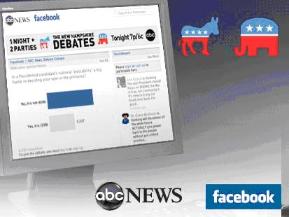Is Mike Huckabee Your Friend?

A few weeks ago, I noticed a peculiar message showing up in my Facebook news feed. It appeared as though my friends were participating in online debate groups. With the US Politics application, they were voting on political issues and commenting on their responses.
I’ve never been a terribly political person so I didn’t bother to add the application. What did I care about broadcasting to my friends whether or not I felt the U.S. is too dependent on foreign oil? It wasn’t until I saw that Facebook was a sponsor of the New Hampshire debates that I realized just how much of a presence Facebook will have in this year’s presidential election.
I was a Facebook user during the 2004 presidential election. At that time, the greatest opportunity I had to voice my opinion was by joining a group to support a candidate or to be “friends” with a candidate (Although, I doubt the candidate pages were actually managed by members of the candidate’s campaign and more likely just an enthusiastic college student who wanted a John Kerry alter ego.). Over time, Facebook added a “political views” field to profiles, allowing users the option to declare the extent to which they are conservative or liberal. Justin Smith of InsideFacebook.com compiled some interesting data on Facebook users and their political views. Perhaps the most fascinating statistic from the study is that nearly half of the adult population of Washington D.C. are Facebook users.
Whereas four years ago, Facebook was a small site open to a handful of colleges, this year it is a major presence within ABC’s election coverage. I had to chuckle at how the newscasters would frequently reiterate that Facebook was a “popular social networking site,” a message intended for viewers outside of the pool of over 60 million active Facebook users.
During Saturday’s debate, there were frequent check-ins on the results of Facebook polls. Viewers were encouraged to go online and voice their opinions, some of which were read on-air. It reminded me of the early days of MTV’s Total Request Live when, as a middle-school student, I realized my opinion not only mattered but could be broadcast on live TV.
When I sat down with a few friends to watch the debates on Saturday, no one in the room really knew who they supported or who they might vote for in a primary. Like most people my age, we planned on making an informed decision but hadn’t yet researched the candidates. However, we also considered an informed decision one which involved receiving information somewhat passively: through conversations with our peers, news stories and popular shows such as The Daily Show and The Colbert Report.
After seeing that Facebook had sponsored the New Hampshire debates, I added the US Politics application to my profile and began participating in online “debates,” voting on issues I felt were important and reading the opinions of both friends and strangers. After clicking around, I realized the application also featured news stories, video clips, message boards and information about each of the candidates. Users can become a “fan” (much like a friend) of as many politicians as they choose. Whether or not these choices are displayed in one’s profile is up to the user.
To date only 16 of my 356 Facebook friends have added the application but I would predict that this number will dramatically increase as Election Day nears. Facebook is quickly becoming the singular tool for keeping in touch, sharing and organizing photos, watching videos, accepting event invitations and even choosing a President.


